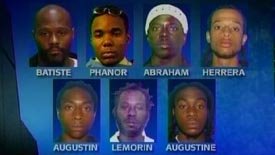We’re Bending the Arc of the Universe Toward Injustice:
Shut Up, Go Shopping, Support the War...and Nobody Gets Hurt!
by JASON MILLER
Remember Martin Luther King and his dreams? Recall how that hopeless idealist dared to conjure notions of the United States treating all people with equality and letting freedom ring? Recollect how he was murdered because he believed a better world was possible and courageously strove to make that world a reality?Sorry Dr. King. Your martyrdom was wasted. Your glorious dream is on life support and the prognosis is quite grim.Until recently, dark clouds were gathering on the horizon for America’s ruling elite. Public opinion was rapidly souring against them. Less than 1/3 of their subjects favored their corporate welfare programs, shredding of the Constitution, eradication of the middle class, implementation of an official state religion, elimination of social programs, and endless war against a phantom enemy.But social conservatives, nationalists, wealthy elites, the Religious Right, the Neocons, Fox “News”, major corporations, and several other factions have “stayed the course”. Abandoning common sense and humanity, this loose coalition comprised of dogmatic devotees of imperialism, Social Darwinism, and American Exceptionalism manned the bulwarks to avert disaster in the November elections.What nightmare spurred them into action? It was becoming a distinct possibility that the Not Quite as Evil Party would break the Blatantly Evil Party’s stranglehold on our government by gaining a majority in Congress.Herculean efforts by these champions of the “American Way” have reaped rich results. Numerous events over the last few months have breathed new life into their cause. All of us Americans need to get down on our knees and thank OUR Christian God for the cornucopia of blessings He has recently bestowed upon His chosen nation.Our Congresspeople led the charge by reassuring the American public that they will not rest in their noble battle to crush those heinous gays who are subverting the sanctity of marriage in the United States. They also sent a clear message to those would-be desecrators of the Red, White, and Blue. Our “elected representatives" will not relent until the United States has a law punishing those who dare to burn a nationalistic symbol of imperial conquest. However, one wonders why we would need such a law. How would a flag so drenched in the blood of innocent victims even ignite?Our $600 billion a year military finally ended two years of futile efforts by killing Abu Musab al-Zarqawi. Two eyes and a mouthful of teeth were merely enough to further whet the American appetite for vengeance and more killing. Mission accomplished again, eh Mr. Bush?In its infinite benevolence and wisdom, the Bush Regime (buttressed by its accomplices at AIPAC and in the mainstream media) has maintained the illusion of the righteousness of Israel’s ongoing genocide against the Palestinians. Washington received Ehud Olmert and Bush kissed the ring of yet another leader of the parasites dwelling on Palestinian land and thriving on billions of US tax dollars. Ardent supporters of Israel's right to exterminate the Palestinians can rest easy knowing that the United States will continue doing the “right thing”.Earlier this month, three of the suspected terrorists from Guantanamo Bay validated the existence of the American Gulag and the use of torture by the United States in the "War on Terror". In a cunning and calculated move of “asymmetrical warfare” they committed suicide. Their attempt to expose the standard-bearer of human rights as ruthless torturers back-fired miserably. In their pathetic attempt to manipulate public opinion by hanging themselves, these three men demonstrated that the United States has no choice but to keep suspected Middle Eastern terrorists caged like animals under brutal conditions. Just ask Don Rumsfeld.Kim Jong-il and Mahmoud Ahmadinejad, the leaders of the two nations in Bush's "Axis of Evil" which the United States has yet to invade, are each attempting to join the decreasingly exclusive “Nuclear Club”. As the self-appointed “clubhouse monitor”, the United States is thus compelled to maintain its bellicose posture, vast nuclear arsenal, devotion to global military hegemony, and willingness to wage preemptive war.How fortuitous for our ruling elite that the FBI arrested the seven “homegrown terrorists” in Miami Thursday night. Allegedly, the “Miami 7” were conspiring with undercover FBI agents (whom they purportedly thought were members of Al Qaeda) to blow up the Sears Tower and the FBI building in Miami.Naturally the “War on Terror” must continue if American citizens are plotting attacks on American soil. The FBI apprehended these seven men just in time to convince a malleable American public that NSA eavesdropping and analysis of cell phone records without judicial oversight is essential to our security. This arrest will also validate Friday’s announcement by Treasury Secretary Snow that the United States has been monitoring banking transactions in the “War on Terror”.And as an added bonus for social conservatives, the suspects are Black. The United States already has the highest rate of incarceration in the world. We have 23% of the world’s prison population and only 5% of the world’s overall population. Half of the prison population in the United States is Black. How can 13% of our population comprise 50% of the prison population? Simple. Our laws and law enforcement actions are rife with racial bias.Virtually each time a social problem arises in the United States, our leaders pass another law. Their goal is to punish and control rather than attempting to eradicate causes like poverty, unemployment, racism, and woefully inadequate educations. Seven suspected Black American terrorists “prove” the necessity of the prison industrial complex to control the “inferiors” in our population and to compensate for the loss of that “peculiar institution”.After the arrest, Attorney General Alberto Gonzales stated:"They were persons who for whatever reason came to view their home country as the enemy."Once could readily conclude from our chief law enforcer’s conclusion that these seven men are guilty until proven innocent. How closely will their experience with America’s “justice” system resemble that of Jose Padilla?If these men are guilty of conspiring to blow up buildings, it is indeed disturbing that American citizens born and raised on domestic soil would be that enraged with one or more facets of our country. It is equally as disturbing that our attorney general blithely commented that they view the United States as “the enemy” for “whatever reason”. Wouldn’t an analysis of the source of their hatred be prudent so we could determine what profound changes the United States, its leaders, and its institutions need to make so that they are not creating enemies amongst our citizenry?Yet from the perspective of those wanting to perpetuate war and justify the creation of a police state, Gonzales summarized the situation well. To examine why Americans would want to inflict carnage and mayhem on their fellow citizens would expose the true agenda of our ruling elite.A substantial number of Americans see our leaders’ moral turpitude, are furious, and are working diligently to evoke change. Perhaps the seven men in Miami simply reached a tipping point. After all, an act of terror is an extreme means to bring about political or social change.Rather than working to create a more equitable and humane society based on the Bill of Rights and the Universal Declaration of Human Rights, the ruling elite and their aforementioned allies prefer to perpetuate a sociopolitical system based upon intolerance, bigotry, avarice, exploitation, militarism, and gross injustice. Meanwhile, “rage against the machine” continues to fester and foment. Hopefully most of the enraged will embrace evolution over revolution, but if they did indeed plot to commit terrorism, the seven from Miami may be a sign of ill portent.On 6/22, Dick Cheney, a man noted for his deep love of humanity and concern for the average American, reminded us that US troops will not be coming home soon:"I realize some have advocated a sudden withdrawal of our forces. This would be unwise in the extreme - a victory for terrorists, bad for the Iraqi people and bad for the United States. To leave that country before the job is done would be to hand over Iraq to car-bombers and assassins."Underscoring and empowering Cheney’s determined stance, both houses of Congress had voted down proposals to impose a timetable for troop withdrawal.Someone forgot to ask Mr. Cheney and our esteemed legislators two important questions:1. Why would they continue to bomb and assassinate once America's occupying army withdrew from Iraq?2. Excepting the Green Zone, when did the car-bombers and assassins hand Iraq over to the United States?The fact that these deeply troubling events occurred just in time to bolster an imploding Bush Regime is further evidence that our constitutional republic is on the verge of extinction. Americans are experiencing a profoundly distressing paradigm shift. A theocratic corporatocracy with powerful nationalistic tendencies is weaving itself into the very fabric of our social, economic, and political systems. And its dynamics and underlying principles are frighteningly similar to those of the fascism implemented by the National Socialists.Remember that from 1933 to 1945 most ordinary Germans complacently and quietly supported their regime. After all, they were not suffering. The Bush Regime is counting on you and your children to do the same.Jason Miller is a 39 year old sociopolitical essayist with a degree in liberal arts and an extensive self-education (derived from an insatiable appetite for reading). He is a member of Amnesty International and an avid supporter of Oxfam International and Human Rights Watch. He welcomes responses at willpowerful@hotmail.com or comments on his blog, Thomas Paine's Corner, at http://civillibertarian.blogspot.com/.


